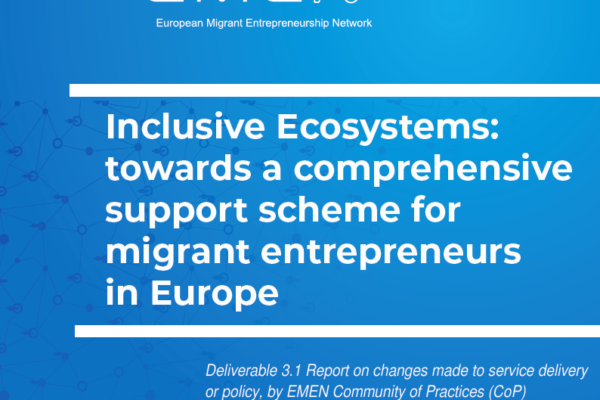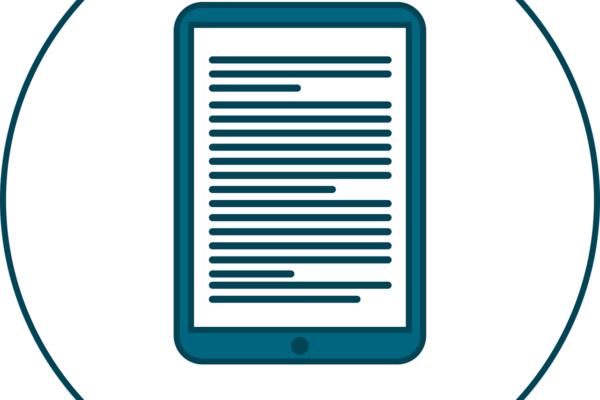Over the last three years, the EMEN (European Migrant Entrepreneurship Network) project has reached out to hundreds of both individuals and initiatives in Europe to share knowledge and experiences on how to better support migrant entrepreneurs, a group that brings a major contribution to our societies through business innovation, new market connections and jobs creation[1].
During this journey, the 12 EMEN partners and the more than 150 organisations that have joined our three community of practices[2] have engaged in a deep peer-to-peer exchange with the final goal of redefining existing support schemes for migrant entrepreneurship in Europe for a more ‘Inclusive Ecosystem: towards a comprehensive support scheme for migrant entrepreneurs in Europe[3]’.
In short, during the period 2017-2020 EMEN’s activities included:
- A final conference with more than 300 participants[4]
- Three international events with more than 60 participants per encounter[5]
- Four thematic webinars[6]
- Two surveys and related need analysis with Migrant Business Support Organisations (MBSO)[7] and chambers of commerce around Europe[8]
- 15 training sessions with MBSO and refugee entrepreneurs for a total of 425 beneficiaries[9]
- Implementation of a diversity tool assessment with 15 chambers of commerce[10]
- Participation in a large number of international conferences and external workshops[11]
- Collection of 23 good practices on supporting migrant entrepreneurs carried out by all EMEN partners as well as via public consultation through the Migrants for Migrants (M4M) call for programmes launched in July 2020[12]
- Production of several materials for better migrant entrepreneurship support, papers, discussions notes, articles and reports[13]
All these numerous encounters have taught us that further efforts to consolidate a wider and more inclusive European ecosystem for migrant entrepreneurship able to address the various transversal challenges the sector face is needed. Such an ecosystem needs to make sure to:
- Strengthen the bonds among local entrepreneurs and local BSO with migrants’ groups, migrant-led organisations and migrant entrepreneurs to
-
- understand that the business cycles of ethnic groups have more steps and face more barriers
- generate networking opportunities
- Reach out to the existing diaspora groups, which are key connectors for newcomers but who lack sufficient visibility.
- Facilitate a closer collaboration among all socio-economic key actors.
- Combine training, mentoring and coaching with well-structured interventions addressing social, cultural, educational and professional aspects of integration.
- Ensure ICT literacy of both migrant entrepreneurs and migrants associations during the training processes to overcome the digital gap, particularly important in terms of COVID19.
- Involve personnel with migrant backgrounds to allow highly personalised services in terms of cultural understanding.
- To exchange about the broad range of formal financial intermediaries existing, but also and most importantly in the time of recession, new ones emerging, to become familiar with the new financial landscape, which is changing dramatically with the emergence of internet-based channels and financing mechanisms that have been set up for and by migrants.
- To set and constantly revised European quality standards for migrant entrepreneurship support schemes against the current trends, digitalisation and the ‘Green deal’.
While migrant entrepreneurs have proved to be resilient individuals that bring new market opportunities to their new locations, they are often the most hit by economic downturns. In the context of the current pandemic crisis, they experience higher revenues losses and their distribution networks and supply chains were more affected[14]. New opportunities such as the EU Green Deal will be at the core of the EU’s recovery strategy post COVID19 and we need to ensure this also benefits the most vulnerable of our societies and do not wide the already existing gap.
What’s next?
After three exciting years, EMEN project is coming to an end, but its 12 partners and the wide EMEN community will continue working for more inclusive growth in Europe. We feel is too soon to say goodbye to this enriching opportunity and therefore, our website and social media channels will remain open to make sure everybody can access and use the resources we have developed as well as continue reaching out for future collaborations.
Thanks for joining us in this adventure!
Patricia Martínez Sáez (AEIDL) on behalf of the EMEN consortium.

[1] See for instance OECD/European Union (2019), The Missing Entrepreneurs 2019: Policies for Inclusive Entrepreneurship, OECD Publishing, Paris, https://doi.org/10.1787/3ed84801-en
[2] The three Communities of Practice (CoPs) of the project are: (1) Coaching and mentoring (led by Social Impact gGmbH, Berlin); (2) Access to Finance (led by THUAS-FN, The Hague); (3) Professionalisation of migrant entrepreneurs’ associations and diversity management in chambers of commerce (led by UNITEE, Brussels).
[3] See the https://www.emen-project.eu/download-the-emen-final-publication/ to read our main findings and conclusions
[4] See the official website of the final conference https://www.growing-europe.eu/
[5] The first annual event in Munich organised by CoP1 1st EMEN Annual Conference – Munich, April 2018. The second annual event in The Hague organised by CoP2 Annual event in The Hague – Conference Report. And the third annual event in online format organised by CoP3 3rd EMEN Annual event. CoP3 Diversity management (online). Conference report
[6] See https://www.emen-project.eu/the-emen-webinar-series-what-a-journey/
[7] See the Survey report on mainstream business associations
[8] See Survey report on professionalization needs of migrant entrepreneurs’ associations
[9] See Final training materials in professionalization and diversity management
[10] Idem 6.
[11] See for instance EMEN participation at the M-UP and MAGNET events such as https://www.emen-project.eu/emen-at-the-m-up-and-magnet-conference-in-barcelona/ or https://emen-up.eu/event/webinar-migrant-entrepreneurship-access-to-finance/ , but also other EU projects such as https://www.emen-project.eu/emen-at-democracy-alive/, https://www.emen-project.eu/the-emen-project-goes-to-luci-sul-lavoro-images-music-and-words-that-tell-the-story-of-work/, https://www.emen-project.eu/emen-at-agorada-2019/
[12] https://www.emen-project.eu/wp-content/uploads/2020/07/M4M-A4_links-.pdf
[13] See the https://www.emen-project.eu/library/
[14] David Halabisky, Organisation for Economic Co-operation and Development (OECD) during the EMEN webinar ‘The essence of migrant entrepreneurship and business associations’ https://www.emen-project.eu/the-essence-of-migrant-entrepreneurship-and-business-associations-the-third-webinar-of-the-unlockingdiversity-series/


